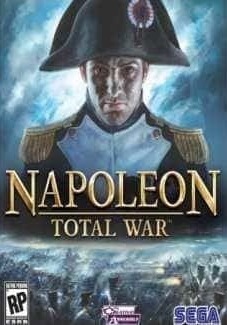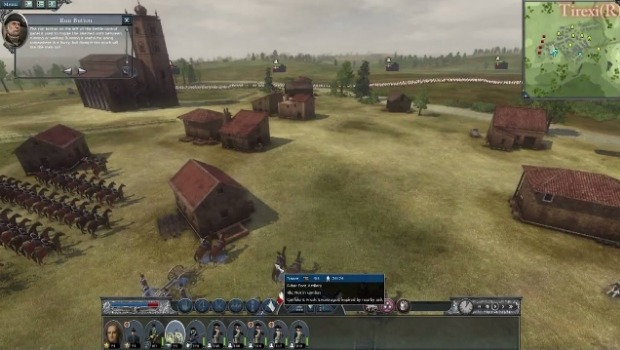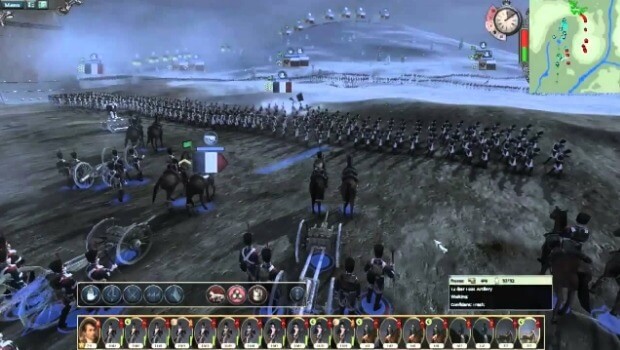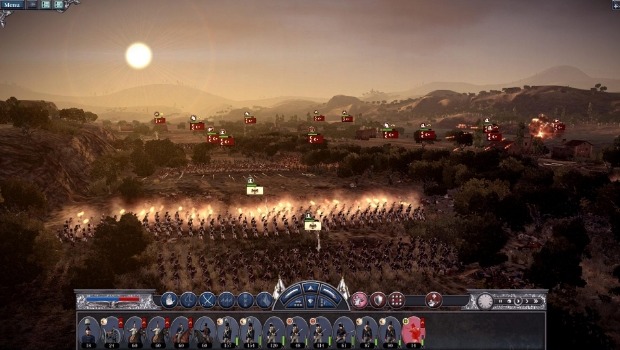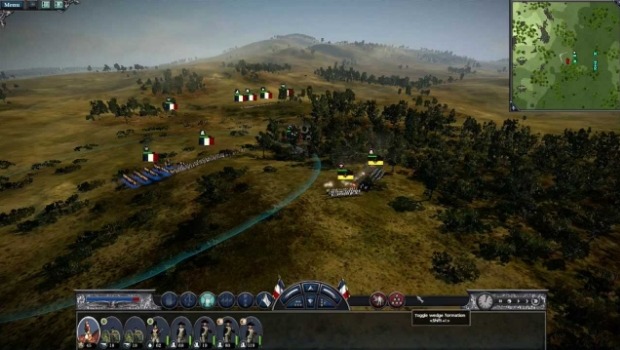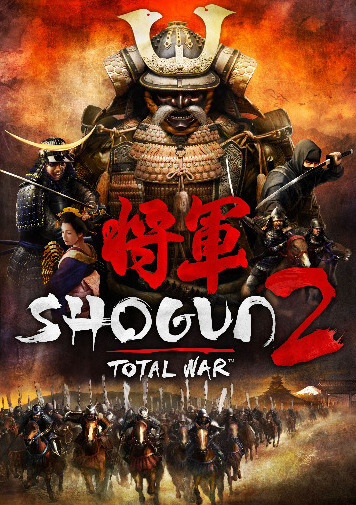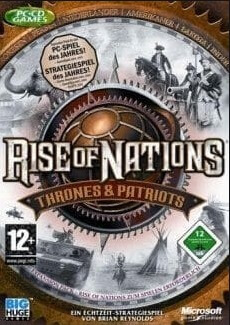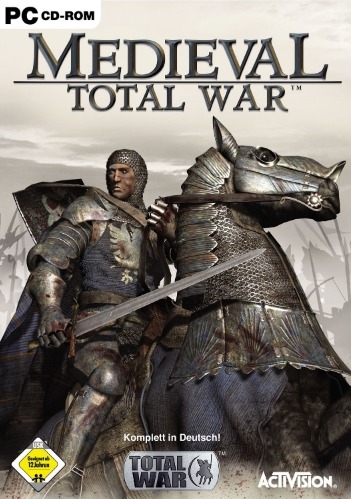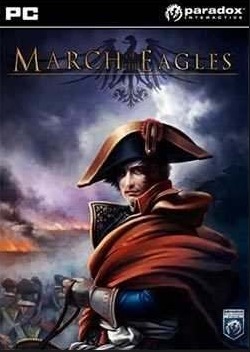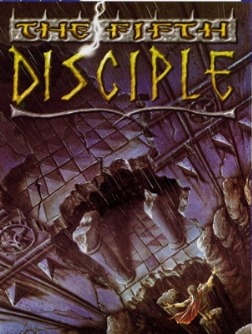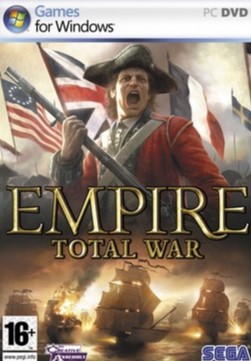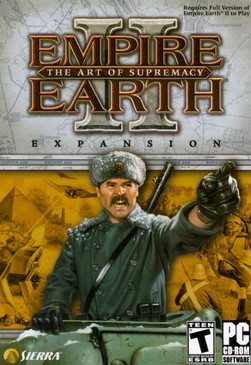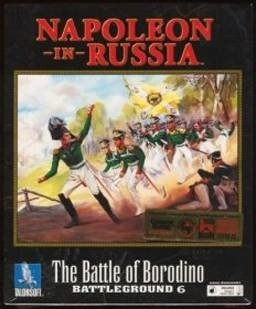As with all other games in the Total War series, Napoleon consists of two gameplay types: a turn-based geopolitical campaign – which requires players to build structures in a faction's territories to produce units and create a source of income, research new technologies, deal with other in-game factions through diplomacy, trade and war, send agents on missions, create and command armies, and eventually become the world's dominant faction – and real-time tactical battles where players command huge armies to direct the course of any battles that take place.
Napoleon contains four campaigns, two of which follow Napoleon's early military career. The first career event is the Italian campaign of 1796, while the second is the French invasion of Egypt in 1798. Both feature smaller, optional missions that help drive the story forward. The major French campaign, however, is the so-called "Mastery of Europe," which resembles the holistic modes of previous Total War games. Conversely, the "Campaigns of the Coalition" allows players to govern Great Britain, Russia, Prussia or the Austrian Empire and attempt to defeat Napoleonic France in Europe. Each major campaign requires players to obtain a certain number of territories, although unlike Empire: Total War, one does not need to wait till the end of the campaign to be declared winner. Like in Empire, revolutions and revolts can affect the course of a player's campaign; France however in the Mastery of Europe campaign is all but immune to revolution. For the first time in the Total War franchise, attrition now plays a part on the campaign map. Depending on the location, armies will lose men due to heat or snow. Unlike Empire, the losses an army has on campaign are automatically replenished when in friendly territory. Some of Napoleon's most famous battles such as Austerlitz, Battle of the Pyramids, and Waterloo are available as historical scenarios, separate from the campaign.
As with previous Total War games, battles can be fought manually or auto resolved when two hostile armies or navies meet on the campaign map. Armies and navies consist of Napoleonic era land units and ships respectively. On the battle map, the attacker will win if he manages to rout the entire enemy army while the defender wins if he manages to rout the attacker or have at least one unit remaining when the time limit runs out. Similar somewhat to Empire, land units are armed with gunpowder weapons such as muskets and cannons and melee weapons like swords, sabers and bayonets. Units have morale that will fall if massive casualties are incurred, if they are flanked, the general is killed and several other factors. Once a unit's morale is broken, it will rout and attempt to escape the battlefield. Broken units may regain morale if the balance of power changes, so to ensure these units will not remain a threat, players ought to chase them down with light cavalry. Infantry units may engage in both firefights and melees, cavalry can generally only fight in a melee with the exception of mounted infantry and missile cavalry while artillery units are best used to hit targets from afar. The Creative Assembly also implemented a feature wherein while playing a campaign, several notable commanders, including Napoleon himself, instead of being killed on the battlefield, are wounded and sent back to the faction's main capital.
A new physics system had been implemented for the real-time battles, so that when cannonballs hit the ground, for instance, they leave impact craters. Gunpowder smoke lingers and reduces visibility in protracted engagements. Mike Simpson, The Creative Assembly's studio director, reported that there are a number of environmental factors that affect battlefield tactics: gunpowder backfires when it rains, and the elevation of landscape affects the range of munitions. Individuals within a unit now vary to a greater degree, and are no longer as generic as in previous titles in the series. The campaign map is narrower in focus, but more detailed than Empire's campaign map. Turns in Napoleon: Total War represent two weeks, while previous titles sported turns that were the equivalent of at least six months. Additionally the game's artificial intelligence system had been modified. There was also a new uniform system that includes approximately 355 non-editable uniforms that has so far never been released, casting a doubt of its creation.
In addition, Napoleon: Total War contains several new multiplayer features and a voice command utility to speak to other players via Steam. Unlike previous Total War titles, there is now the option for a "drop-in" multiplayer campaign mode: when playing a campaign against the computer, it is possible to allow another user to join via a lobby and take control.
Multiplayer
The multiplayer mode has a campaign mode. Multiplayer drop-in battles allows to fight human opponents in the single player campaign battles. Steam achievements, game play bonuses and voice communications are also available.
Reception
Upon release, Napoleon: Total War received positive reviews. The game and its developers alike were praised for a number of graphical and AI improvements, along with the new campaign features and multiplayer modes.
IGN remarked that the "tactical battles are still some of the most amazing we've ever seen in any game." Gameplanet came to the same conclusion, stating that "graphically, the battles leave Empire in the dust, featuring five times more particles per effect." GameSpot praised the interface, saying that "it never feels cluttered, and the bulk of the screen is always devoted to the action."
Other aspects of the game received a mixed reaction. According to Eurogamer, despite occasionally poor decision-making "the AI will still hold its own," and provides players "with a challenge that suits the difficulty." Other criticisms focused upon the somewhat linear story-mode campaigns, the duration of naval engagements and the stability of the game's Netcode. Actiontrip commented that "while still a good strategy game, Napoleon: Total War seems to offer less freedom to players in terms of how they can resolve various battle situations." Tom Chick, in his GameSpy review, gave the game a 2.0 out of 5, citing "Bad AI" and the game "feeling like a re-skinned Empire" for the score. Game Revolution felt the same, noting that "the problem Napoleon has is that it's not just like Empire, it is and only is Empire...It feels like an expansion at best, yet it's being sold like it's a brand new game."
Despite the complaints, most of the reviews were ultimately favourable to Napoleon, with the game earning an aggregated score of 81% at Metacritic and 81.61% at GameRankings.
The game was awarded Best PC Game at Milthon European Game Awards in Paris on 22 September 2010.
Score composers Richard Beddow, Richard Birdsall and Ian Livingstone won the British Ivor Novello Award for Best Original Video Game Score on 19 May 2011.
